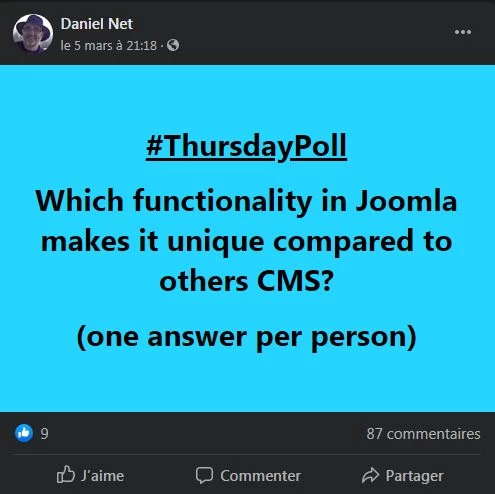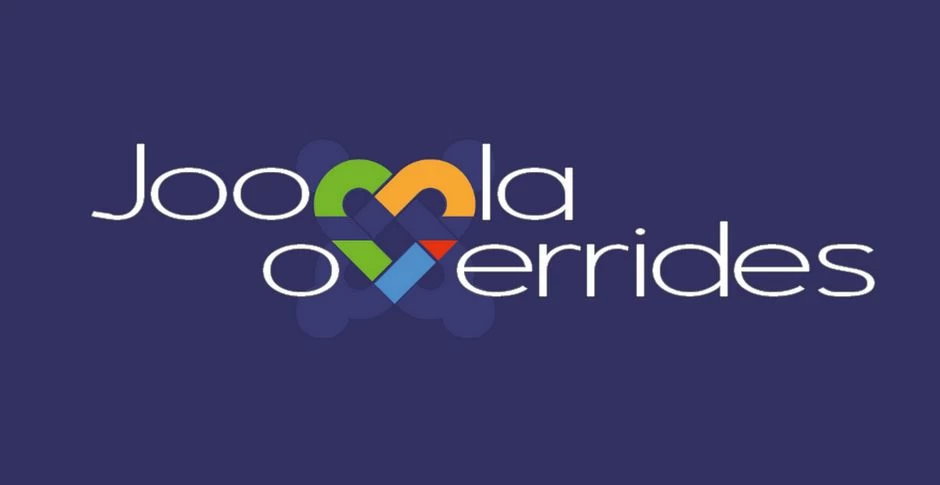Time flies and Joomla is still one of the best Content Management System around. 18 years later, this is one of the most used tool in the world to create websites. You maybe not know but Joomla presently powers approximately 3.6% of market share (more than 2 million) with some famous ones. Good job, Joomla!
However, Joomla offers a wide choice of extensions (more than 8,000) and templates to create any kind of project. The only limit here is probably your imagination. Joomla users find their platform much more robust and much more secure than any other CMS. While it’s true that Joomla needs a longer learning curve than a basic tool, there are also many reasons why Joomla is still the second most used CMS in the world.
In March 2020, I've started a topic on the non offical Facebook Joomla group:
Many Joomlers have participated to this discussion (thanks to them). Based on their answers, here are the reasons why you should consider Joomla as a serious option for a website project in 2024.
Joomla is an obvious choice
The Flexibility
For many Joomlers, the flexibility is really the key.
For example, with Joomla you're allowed to use multiple and different template on the same website. If you want a specific template for your blog, another one for your homepage or your products pages, it's possible. Just install the template, assign it to you menu item and it's done.
If you want to display different types of content on your website, you can do it with Joomla gives you , The greater flexibility of the modules allows you to mix up the content types on each webpage. By contrast, Joomla gives you a fantastic design freedom.
Another example oftenly quoted by the Joomlers in their answers is the power of the modules which can be assigned to a specific page or menu. And yes it's true, this native feature is really awesome.
The Multilingual
Many people around the world live in countries where different languages are spoken. I'm thinking about many countries in Africa, Canada, Belgium, Switzerland, etc. In this case, multilingual websites are just mandatory.
With Joomla, the multilingual functionality is 100% native. You don't need to add anything, it's already in the box. To create a multilingual website, you just have to select the desired languages during the installation process and it's done. Otherwise, just head over to the language manager and select the languages you wish to install into your site.
Because of this amazing native feature, there are many Joomla translators all around the world. For the core but also for the extensions. Nowadays, Joomla is available in more than 75 languages. And everyone is free to contribute.
For more detail on this feature, you can read the official documentation.
The Security
The security was also frequently quoted by the Joomlers. Because yes, Joomla is a strongly secure CMS, by default.
To be very honest, secure efficiently a website is not so simple, specially for newbies. In fact, if you want to ensure a strong security on a website, there are two main solutions:
- you choose a CMS where HTTPS, SSL, and the two-factor authentication are not native, so you'll have to add some extensions and/or to make some code modifications,
- you choose a secure CMS by default like Joomla where HTTPS, SSL and the two-factor authentication are options to activate in the admin panel.
Of course and like the others CMS, Joomla provides a wide variety of security extensions. The difference is that you'll do a lot less legwork in securing a website powered by Joomla than you would with any other CMS.
The Access Control List
Very frankly, this Joomla native feature is a fantastic one and maybe the main reason why Joomla is an obvious choice. And also one of the most powerful of this CMS. As I remember, it was added in 2011 with the Joomla 1.7 version. Some others CMS still don't have it as native, ten years later...
The ACL (Access Control List) gives you the possibility to grant access to users to your content based on their level. This is really useful when it's comes for a structure project like an administration, an intranet, a large enterprise, etc.
Let's take an example to be clear.
Imagine a University's website with the administration team, the teachers, the students and the public. Now, let's see how these people can interact each others and with the website:
- The administration team can rule the website, publish content for public, for the students but also for teachers. These contents may be available for all groups, some groups or just for one of them.
- The teachers can read their contents but also publish their content for their students (based on their grade and specializations),
- The students can read and access their contents based on their specialisation and sent by their teachers and the administration team, for example
- The public can only read the public content.
With Joomla, you can easily manage this kind of project without adding a single extension. Amazing, isn'it?
For more details on this feature, you can read the article A Case for Role-Based ACL and this official tutorial.
The Backend Organization
For many Joomlers, the Joomla administration panel is much more organized and the available options are much more straightforward than in others CMS.
If you want to add a new menu, the option is so simple and doesn't require a bunch of extra coding. If you need to restrict articles to certain pages, you can do it easily. For users who need a powerful backend organization, Joomla is a better choice.
Take a look at the Joomla global configuration and you’ll find options for everything: redirects, SEO settings, lists length, email settings, parameters, and many more. Instead of having parameters for just a few components for your website, you have parameters for all components. That's amazing.
I'm ok, all these options and parameters will require a bit more work from the user and newbies will have a learning curve a bit longer. However, the extra time needed to learn Joomla is worth it due to increased functionality.
The overrides
To be very honest, this fantastic feature is one of the favourite of the Joomlers. And I love it too.
Imagine a component or a module that changes its display on different pages simply by selecting a parameter in the admin panel. This is not science fiction, it's already possible with Joomla. Simply with some lines of code, you can create as many different displays as you want or need. Without any limits.
If you want to discover the wonderful world of the Joomla's overrides, I invite you to have a look to this incredible collection.
Joomla deserves a try
If despite all this you're not yet completely convinced, my best advice would be testing Joomla in live conditions. Without installing anything and in few minutes, you can run a Joomla website. For free! Open https://launch.joomla.org and enjoy the experience!
Joomla is the best solution for any kind of websites. This powerful CMS provides the scalability necessary to handle small, medium and large website projects. All its native features can empower any kind of websites. And if the security is a matter to consider for your project, then you obviously needs a CMS like Joomla.
Where do you envision your website in the next years? If you see it as a simple website with only minimal feature changes, then using a basic CMS may be an option to consider. However, if you are more ambitious for your website and see either the need to handle securely more complex users, data and content, then Joomla is going to be the obvious choice to consider.







